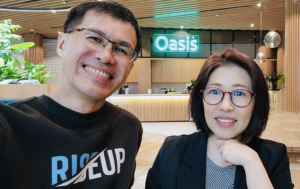Authentic leadership means leading with honesty, integrity, and alignment between your values and actions. It’s not about a title or position—it’s about how you show up in life and work every single day.
That truth came alive in my recent RISEUP Conversation with Kelly Koh, CEO of Ngee Ann Academy. Years ago, I facilitated team sessions for his division at SIT, and reconnecting reminded me of a lesson too often overlooked: leadership isn’t just what happens in the boardroom—it’s forged in how we choose to live.
Kelly shared how teaching in a small, rural Japanese school reshaped his outlook:
“That experience totally shaped the way he look at education and most importantly – LIFE!”
His story reveals the heart of authentic leadership: living boldly, embracing difference, and showing up as your true self.
What Is Authentic Leadership?
According to Harvard Business School, authentic leadership is “a leadership style rooted in honesty, transparency, and integrity, where leaders align their actions with their values.”

The Center for Creative Leadership (CCL) adds that authenticity means “leading with self-awareness, transparency, and consistency.” When leaders embrace this approach, they create environments of trust and resilience.
Research from PositivePsychology.com breaks it into four essentials:
- Self-awareness – understanding your values and motivations.
- Relational transparency – building trust through openness.
- Balanced processing – listening and considering multiple perspectives.
- Internalized moral perspective – making choices guided by your core values.
If you’d like to strengthen your foundation, check out our guide on The Essential Leadership Skills Every Professional Must Develop
The RISEUP Formula: Bold, Different, Yourself

Kelly’s leadership takeaways align with what global experts emphasize. Here’s how they translate into practice:
1. Be Bold
Authenticity begins with courage. Kelly’s leap into the unknown—teaching in Japan—wasn’t just a career move; it was a mindset shift. Bold leaders:
- Take values-driven risks.
- Choose growth over comfort.
- Act with conviction even in uncertainty.
Related read: Loyalty in Leadership: Protecting Your People Builds Unbreakable Trust
2. Be Different
In a fast-changing world, authentic leadership often means breaking from the norm. As Forbes notes, authentic leaders “don’t conform to fit a mold—they create their own.”
Being different looks like:
- Exploring new directions instead of defaulting to the familiar.
- Taking sabbaticals or pauses to rediscover yourself.
- Living intentionally, not waiting for “someday.”
Kelly summed it up powerfully:
“We only die once, but we get to live every day. The real question is: how are we truly living each day?”
To dive deeper into human-centered leadership, see Start Leading by First, Stop Demotivating
3. Be Yourself
True leadership happens when you stop splitting your personal and professional selves. When you lead as your whole self, you:
- Conserve energy and reduce burnout.
- Build trust and stronger relationships.
- Unlock creativity and innovation.
How to Practice Authentic Leadership? (5 Practical Steps)

Step | What to Do | Why It Matters |
1. Reflect on Values | Identify your non-negotiables in work and life. | Builds self-awareness and decision clarity. |
2. Seek Honest Feedback | Ask peers and mentors for perceptions of your leadership. | Reveals blind spots, improves transparency. |
3. Share Stories | Talk about challenges and lessons, not just successes. | Humanizes leadership and builds trust. |
4. Align Decisions with Values | Pause and ask: “Does this reflect who I am?” | Ensures integrity in every choice. |
5. Communicate Authentically | Be open about struggles when appropriate. | Creates psychological safety in teams. |
For more tools to strengthen resilience in leadership, visit Coaching to Performance: Essential Strategies for Effective Results
Final Thought: Life and Leadership as One

Consistency between how you live and how you lead conserves energy, inspires others, and unlocks deeper contribution.
As Kelly reminded me during our RISEUP conversation:
“Every day is a fresh opportunity to choose boldly and live authentically.”
Authentic leadership is less about position and more about presence. The challenge for each of us is simple: Will you dare to be bold, different, and unapologetically yourself—today?
For practical examples of sustainable leadership, read How Uplifting Others Ensures Sustainable Success with Transformational Leadership
Frequently Asked Questions
1. What is authentic leadership in simple terms?
2. Why is authentic leadership important?
3. How do you become an authentic leader?
4. Can anyone be an authentic leader?
5. What are the challenges of authentic leadership?

A trailblazer in humanising leadership and building high-resilience teams. As a former United Nations Peacekeeper, he leverages his high-stakes experience to redefine leadership dynamics. With a career distinguished by numerous accolades, Joseph now helps organizations thrive through a human-centric approach, enhancing performance, productivity, and workplace culture.







